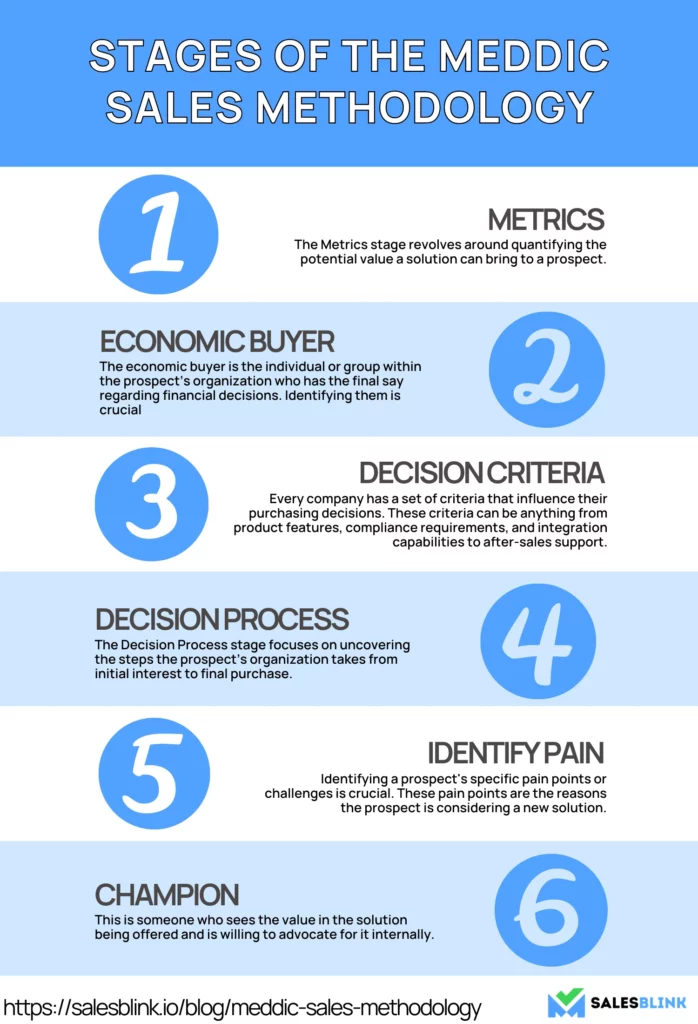The Complete Guide to Using MEDDIC Sales Methodology
Do you know that 67% of lost sales happen because leads aren’t properly qualified before entering the sales funnel? That’s a lot of lost opportunities! Without a proper qualification framework like MEDDIC sales methodology, you’re likely wasting time and resources on leads that are not a good fit for your product or service.
This can lead to lost sales, frustrated sales reps, and a low close rate.
In this guide, you will learn about the MEDDIC Sales Methodology and how to use this framework to improve your qualification process, find good prospects, and increase your sales chances.
Uncover the secrets of successful MEDDIC sales qualification and charge your sales efforts today.
Table of Contents
What Is The MEDDIC Sales Methodology?
MEDDIC sales methodology is a robust qualification framework used in B2B sales to improve the lead qualification process.
In the 1990s, Jack Napoli and Dick Dunkel created the MEDDIC sales methodology. They implemented MEDDIC at their company, Parametric Technology Corporation (PTC), and it helped them triple their sales from $300 million to $1 billion over a span of four years.
MEDDIC framework stands for:
- Metrics
- Economic buyer
- Decision criteria
- Decision process
- Identify pain
- Champion
MEDDIC sales can adapt and remain relevant as the sales process progresses. It helps sales teams by providing a structured way to qualify prospects and potential buyers. This lets sales reps focus their time and energy on the most promising opportunities.
Why Should You Use MEDDIC?
Here’s why you should use MEDDIC,
- Tailored for Complex Sales: Designed for high-value, intricate sales with multiple stakeholders.
- Deep Customer Insight: Emphasizes understanding customer needs, quantifiable benefits, and purchase criteria.
- Structured Strategy: Provides a systematic approach, ensuring no crucial step is overlooked.
- Risk Management: Understands decision-making processes and identifies key decision-makers to mitigate risks.
- Accurate Forecasting: Offers clear deal qualification criteria, leading to more reliable sales forecasts.
- Competitive Awareness: Always keeps an eye on the competition, aiding in unique value proposition development.
- Champion Cultivation: Promotes creating an internal advocate within the prospect’s organization.
- Efficiency: Helps in resource allocation by identifying likely-to-close deals.
- Skill Enhancement: Encourages the development of deeper questioning, listening, and analytical skills.
- Promotes Collaboration: Enhances sales unit teamwork and fosters better client relationships.
Who Should Use The MEDDIC Sales Process?
The MEDDIC sales process is designed for B2B sales teams, especially the ones focussing on enterprise-level selling where the stakes are high and the sales cycles extended.
It’s particularly beneficial in complex sales environments characterized with multiple stakeholders and layered buying decisions. Given the weight of the purchase decision, this methodology is a boon for those offering high-value products or services that require differentiation from competitors.
Moreover, it aligns well with solution-based selling, where products or services are designed to address specific client pain points instead of generic offerings. Industries marked by tough competition can use MEDDIC to grasp their competitive standing better.
From an organizational perspective, if accurate sales forecasting is a priority, MEDDIC offers a more refined lens for business planning. Furthermore, sales teams striving for operational efficiency and a deeper, more consultative relationship with their prospects will find the structured approach of MEDDIC helpful.
Advantages of MEDDIC
MEDDIC is a well-known sales methodology that benefits sales professionals in improving their B2B sales. Here are some advantages of the MEDDIC framework:
- Qualification: MEDDIC helps sales teams effectively qualify opportunities by focusing on critical criteria. It includes the metrics of customers and their decision-making processes. This ensures that sales teams invest their time and resources in pursuing deals with the highest likelihood of success.
- Accurate forecasting: MEDDIC framework enables sales teams to forecast and manage deals more accurately. It provides a strategy to assess the probability of closing, allowing for better pipeline management and revenue forecasting.
- Increased Sales Productivity: By following the MEDDIC sales process, sales teams can prioritize their efforts on deals with a higher probability of success. This targeted approach saves time and resources. It allows sales reps to focus on closing deals with qualified prospects.
- Better Understanding of Customer Needs: MEDDIC emphasizes identifying customer pain points and understanding their requirements. It enables salespeople to tailor solutions that align with the customer’s needs.
Disadvantages of MEDDIC
While the MEDDIC sales qualification methodology has benefits, there are also some downsides. Here are a few disadvantages of using MEDDIC:
- Complexity: MEDDIC requires a deep understanding and execution of multiple stages, which can be overwhelming, especially for new sales representatives.
- Not Universal: It’s best suited for high-value, complex B2B sales. For simpler, transactional, or B2C sales, MEDDIC might be overkill, making the process inefficient.
- Rigid Framework: While structure can be beneficial, strict adherence to MEDDIC can sometimes affect flexibility. Not all sales scenarios will fit neatly into the MEDDIC mold.
- Require resources: Properly implementing MEDDIC can demand significant training and resources. This can affect smaller companies or startups.
- Overemphasis on Process: The strong focus on process can sometimes overshadow the client’s real needs or unique nuances of a deal.
- Potential for Misapplication: MEDDIC can lead to missed opportunities if not applied right.
In essence, while MEDDIC provides a structured approach to complex sales, it’s crucial to understand its limitations and ensure it aligns with the sales environment in question.
6 Stages of the MEDDIC Sales Methodology
The MEDDIC sales process has six stages. Let’s look at them.

1. Metrics
The Metrics stage revolves around quantifying the potential value a solution can bring to a prospect. Instead of just highlighting features or benefits, you should provide concrete figures that resonate with the prospect’s business goals.
For instance, if selling a software solution, instead of just saying it improves efficiency, you can point out that it can boost productivity by 25%, resulting in potential annual savings of $200,000. Presenting tangible metrics gives the prospect a clear vision of the Return on Investment (ROI), making the sales proposition more compelling.
2. Economic Buyer
Identifying and engaging with the economic buyer is crucial. This is the individual or group within the prospect’s organization who has the final say regarding financial decisions. While they may not always be the end-users of the solution, they have the power to approve or deny the purchase based on its economic viability.
To successfully navigate this stage, you need to tailor your pitch to demonstrate the direct economic value of your product or solution. This involves highlighting cost savings, revenue growth, and other financial metrics that appeal to the economic buyer’s interests.
3. Decision Criteria
Every company has a set of criteria that influence their purchasing decisions. These criteria can be anything from product features, compliance requirements, and integration capabilities to after-sales support. You must understand and align with these criteria to ensure your solution fits the bill.
Engaging in open dialogues, asking probing questions, and conducting thorough need assessments can help you understand these criteria. With this knowledge, you can tailor your pitch to stress how your solution meets or surpasses the set criteria.
4. Decision Process
Beyond knowing what criteria influence a purchase, understanding how decisions are made is equally vital. The Decision Process stage focuses on uncovering the steps the prospect’s organization takes from initial interest to final purchase.
By understanding the decision-making process, you can anticipate potential roadblocks, prepare for objections, and ensure you provide relevant information at every stage. This might involve knowing when to offer demos, when to provide detailed technical specs, or when to engage with different stakeholders.
5. Identify Pain
At its core, sales is about solving problems. Thus, identifying a prospect’s specific pain points or challenges is crucial. These pain points are the reasons the prospect is considering a new solution in the first place.
During this stage, you should ask open-ended questions to get to the root of the problem. Understanding these pain points allows them to position your solution as the ideal remedy, making it evident that you are not just selling a product but offering a solution to a pressing issue.
6. Champion
Last but certainly not least is finding a champion within the prospect’s organization. This is someone who sees the value in the solution being offered and is willing to advocate for it internally. While the economic buyer holds the purse strings, the champion can be instrumental in influencing the decision in your favor.
Building a relationship with a champion requires regular communication, providing them with the necessary tools and information to advocate effectively, and ensuring they see personal value in the solution’s success.
What Are The MEDDIC Variations?
The MEDDIC framework allows salespeople to determine which potential customers are worth focusing on. As you already saw, it has six parts: Metrics, Economic Buyer, Decision Criteria, Decision Process, Identify Pain, and Champion. However, some variations of this framework make it even better.
One variation is MEDDPICC, which adds an extra “C” for Competition. It shows an understanding of who else is selling similar things and how your product is better. By knowing your competition, you can make your product stand out.
There’s also MEDDPIC, which adds an extra “P” for Paper Process. It implies understanding all the paperwork and steps needed to make a purchase. By knowing the process, you can make things go smoother and faster.
These variations of MEDDIC help salespeople understand their customers better and increase their chances of making a sale. By using these variations, salespeople can be more prepared and better plan when selling their products.
How To Implement The MEDDIC Methodology?
Implementing the MEDDIC sales methodology involves following a structured approach to sales or decision-making processes. Here are the steps to implement MEDDIC sales model:
1. Identify parts of your qualification process that align with MEDDIC

When it comes to qualifying potential customers using the MEDDIC sales methodology, there are a few important steps that align with this approach.
- First, you must understand your customer’s “Metrics” or goals. This will help you determine if your solution can meet their needs.
- Next, identify the “Economic Buyer,” the person with the power to approve the purchase. Find out who has the authority.
- Then, look at the “Decision Criteria” your customer uses to evaluate options. Finally, make sure your product meets their requirements.
- It’s important to understand the “Decision Process” and timeline. This will give you an idea of how ready your customer is to decide.
- Next, focus on “Identifying Pain” points or problems your customer wants to solve. Then, ensure that your product addresses its challenges.
- Lastly, find a “Champion” within your customer’s organization who supports your solution. They can help convince others to make the purchase.
2. Know Your Buyer Personas

Buyer personas are like imaginary profiles of ideal customers. They help you define and understand your customers’ requirements and concerns.
Knowing your buyer personas helps you be ready for any concerns or objections the customers might have. It also enables you to explain why your product or service is a good choice for them.
When you use buyer personas in your sales process, you can find better leads, show your product as a wise choice, and build good customer relationships. This makes your sales better and makes your customers happier.
3. Standardize the MEDDIC Process for your organization

To standardize the MEDDIC sales process for your organization and implement the MEDDIC sales method, follow these steps:
- Understand the MEDDIC framework: Learn about the five critical parts of MEDDIC: Metrics, Economic Buyer, Decision Criteria, Decision Process, and Identify Pain. Know how each piece helps make sales successful.
- Customize MEDDIC for your organization: Make MEDDIC fit your organization’s needs and target market. Adjust it to match your sales cycle and what your customers want.
- Create a standard playbook: Make a detailed playbook that shows your sales team the steps of the MEDDIC process. Explain what they need to do at each stage to succeed.
- Train and support your team: If you are heading a team, teach reps about MEDDIC and how to use it. Help them understand why each part is essential and how to apply it in real situations. Offer help and coaching as they use MEDDIC.
- Track and report progress: Keep track of significant numbers and milestones throughout the MEDDIC process. This helps you see how sales are going and find areas to improve.
4. Provide training and coaching

Training and coaching are important for using the MEDDIC sales method effectively. MEDDIC sales methodology is a way to sell things based on certain key elements.
In sales training, trainers teach about things like using numbers and facts to show how good your product is (Metrics), finding the right person to make the decision (Economic Buyer), knowing what the buyer is looking for (Decision Criteria), understanding how decisions are made (Decision Process), figuring out the problems the buyer has (Identify Pain), and finding someone who supports your product (Champion).
With training and coaching, you can learn to use MEDDIC well. It helps you understand customers, sell better, and close deals. It’s important to keep practicing and improving these skills to be successful in sales.
5. Keep Improving

To implement the MEDDIC sales method, it’s essential to keep improving. This means constantly trying to get better at selling. To do this, you need to have a growth mindset, which means being open to learning and feedback.
You can improve by getting more training and learning about new things happening in your industry. You can also use data and numbers to see how they’re doing and find ways to do even better. They can change their strategies by looking at what’s working and what’s not.
The idea is continuously improving, like practicing a sport or a musical instrument. You must keep trying new things, learning from your mistakes, and finding ways to improve. This way, you can be more successful in sales and give customers the best experience possible.
MEDDIC Sales Best Practices
Here are some best practices of MEDDIC selling methodology:
1. Understand Your Prospect’s Needs And Priorities

In MEDDIC’s methodology, truly understanding a prospect’s needs is crucial. Engage in active listening and ask open-ended questions to uncover their challenges and goals. Validate your insights to ensure you align with the prospect. This deep knowledge positions you as a trusted advisor, tailoring solutions that resonate and directly address the client’s priorities.
2. Perform Research

Performing research means finding out the needs and demands of your prospect. In MEDDIC selling methodology, it is learning about the requirements of the lead before selling your services. This helps you offer the right solutions to your clients. By investing time in researching, you equip yourself with the details of the lead’s current situation and future aspirations. A well-researched strategy ensures that your offer looks like a solution to their needs rather than a generic product.
3. Listen Actively

Active listening is essential in sales, especially in the MEDDIC approach. It means paying attention to the customer and understanding their needs. Actively listening involves focusing on what the customer is saying, asking questions, and showing empathy.
It helps salespeople build strong relationships and offer the best options. So, if you desire to be a good salesperson, remember to listen actively and show your worry about the customers’ wants and demands.
4. Customize Your Value Proposition

Customizing your pitch using the MEDDIC sales approach is essential for selling the product. You must understand customers’ wants and explain how your product could benefit them.
Everybody is different, so it’s essential to make your pitch personal. Doing this can make your product more appealing and increase your chances of selling. So, remember to listen to the client and show them how your solution can solve their problems and improve their lives.
5. Make Use Of Internal Resources

One of the best practices when selling a product or service is using internal resources. These are the people and tools available within your own company. They can provide valuable knowledge and support to help you make a successful sale.
For example, you can consult with experts in your company to answer customer questions or use software to track your progress. By tapping into these internal resources, you can increase your chances for a successful sale.
6. Use Compelling Sales Messaging

When selling something, you need to use catchy sales messages. MEDDIC sale is a helpful method to do that. First, ask important questions like “Is this person a good match for what I’m selling?”
Then, follow the MEDDIC sales process checklist, which includes knowing their goals, finding the decision-maker, and meeting their requirements. You can use a MEDDIC sales template to make it easier. By using MEDDIC, you’ll be ready and more likely to make successful sales.
7. Try To Create A Sense Of Urgency

Creating urgency in sales is a creative way to practice MEDDIC sales strategy. It means making customers feel like they need to act fast. Salespeople generally do this by showing limited-time offers or discussing the benefits customers will miss if they wait.
They might also share stories about others who acted quickly and benefited. Urgency helps customers see the importance of deciding sooner rather than later. It pushes them to take action and take advantage of good opportunities. So, you can try it today!
Use MEDDIC Sales Methodology to Unlock Your Sales Success
To wrap it up, the MEDDIC Sales Methodology is an excellent resource for becoming great at selling. This guide has given you all the tools and methods required to succeed in sales.
MEDDIC framework helps you understand your customers’ problems and choose the right opportunities. Using MEDDIC, you can make your sales process smoother, win more deals, and build better customer relationships. So, try using MEDDIC and watch your sales improve, helping you achieve fantastic success.
Don’t forget to thank us for improving your company’s sales!
FAQs
The MEDDIC questions are designed for sales managers and sales reps. Sales managers can equip their teams with a proven framework to qualify and move prospects through the sales process. Reps can use these questions to increase sales.
Using the MEDDIC methodology helps in sales qualification, letting you focus on leads more likely to close. Without proper sales qualification, you risk spending time and resources on leads that won’t convert. The MEDDIC methodology strongly emphasizes qualification.
The MEDDIC questions are divided into qualification steps: Metrics Questions, Economic Buyer Questions, Decision Criteria Questions, Decision Process Questions, Identify Pain Questions, and Champion Questions. These questions aim to uncover quantifiable goals, decision-makers, and pain points, among other criteria.







